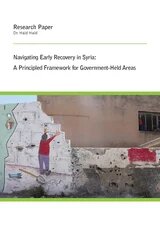Research Paper
Navigating Early Recovery in Syria
A Principled Framework for Government-Held Areas
Complex challenges confront the early recovery efforts in regime-controlled areas of Syria, where traditional humanitarian aid alone no longer meets the nation’s urgent and growing needs.
Though donors recognize the need for this shift, securing adequate financing for early recovery activities remains challenging. Major Western donor states argue that reconstruction efforts should await a credible political transition in Syria, in line with UNSCR 2254. Some fear that the regime may misuse early recovery funding and projects to solidify its authority, hampering a sustainable resolution to the conflict.
Though donors recognize the need for this shift, securing adequate financing for early recovery activities remains challenging. Major Western donor states argue that reconstruction efforts should await a credible political transition in Syria, in line with UNSCR 2254. Some fear that the regime may misuse early recovery funding and projects to solidify its authority, hampering a sustainable resolution to the conflict.
Nevertheless, early recovery funding has risen from $20 million in 2020 to $109.4 million in 2023. Challenges persist in obtaining detailed distribution information, contributing to heightened tension and distrust, and the lack of a clear definition of the term “early recovery” contributes to divergent interpretations and blurred lines with emergency aid and reconstruction efforts.
The regime's history of manipulating humanitarian efforts and concerns about its interference with early recovery funding exacerbate the challenges. Despite denials from IHOs, both primary and secondary data indicate that the regime has imposed restrictions on early recovery activities, including selective project approval, denial of field access, and influence over procurement. These restrictions undermine impartiality, hinder needs assessments, and strengthen the regime's control over funding allocation.
A lack of coordination among both donors and IHOs further complicates the situation, as does unwillingness to discuss the level of regime interference in humanitarian and ER efforts, for fear of losing what funding or access is currently available.
The report offers a structured approach to establishing a principled early recovery framework, detailing practical steps and defining strategic roles for international humanitarian organizations and donors. By addressing critical operational obstacles and emphasizing accountability, the report provides a clear roadmap to guide donors, practitioners, and stakeholders in creating a sustainable, transparent response to Syria’s recovery needs
Product details
Date of Publication
November 2024
Publisher
Heinrich Böll Foundation
Number of Pages
32
Licence
Language of publication
English
